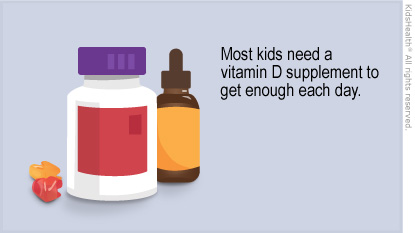What Is Vitamin D?
Vitamin D is a nutrient that helps the body take in calcium from the foods we eat.
What Does Vitamin D Do?
Calcium and vitamin D build bones and keep them strong. Vitamin D also plays a part in heart health, fighting infection, and helping bones heal after an injury or surgery.
Where Does Vitamin D Come From?
The Sun
Our bodies make vitamin D when our skin is exposed to the sun. But getting enough vitamin D from sunlight can be tricky. Most kids and adults spend lots of time indoors at school and work. Plus, the amount of vitamin D we can get from the sun is affected by the time of the year, weather, and even pollution. And when we're outdoors, it's important to protect skin to prevent skin cancer and skin damage from too much sun exposure.
Food
Very few foods have vitamin D naturally. The foods with the most are fatty fish (like salmon and tuna), liver, mushrooms, eggs, and fish oils. Kids don't eat these foods a lot. That's why food companies often "fortify" milk, yogurt, baby formula, juice, cereal, and other foods with added vitamin D.
Supplements
To get enough vitamin D, some kids might need to take a multivitamin with vitamin D or a vitamin D supplement. Vitamin D is sometimes labeled as vitamin D3.
You can buy vitamin D pills, gummies, chewables, liquids, and sprays in stores without a prescription. Ask your doctor for advice on choosing the right one.

How Much Vitamin D Does My Child Need?
Vitamin D is measured in international units (IU).
- Babies younger than 1 year old need 400 IU of vitamin D a day. Baby formula has 400 IU per liter, so babies who drink at least 32 ounces of formula each day get enough. Babies who drink only breast milk or less than 32 ounces of formula each day need extra vitamin D. Talk to the doctor about giving your baby a vitamin D supplement.
- Kids older than 1 year need 600 IU or more of vitamin D a day. Health care providers might want some kids to take 600 to 1,000 IU daily.
Some kids might need more vitamin D, such as those who:
- have some kinds of medical problems (for instance, obesity, celiac disease, cystic fibrosis, multiple fractures, or bone pain)
- are healing from bone surgery (such as after fusion surgery for scoliosis)
- take medicines (like anti-seizure medicines) that block the way the body uses vitamin D
Ask your doctor whether your child needs a vitamin D supplement.
How Can I Help My Child Get Enough Vitamin D?
Because vitamin D is so important, you'll want to be sure your kids get enough. If they don't eat a lot of foods with vitamin D, talk to your doctor about whether a daily supplement or a multivitamin with vitamin D can help.
Health care providers might order a blood test if they think a health problem is keeping a child from getting enough vitamin D. If doctors don't think your child has a health problem, there's no need for a blood test.
What About Calcium?
Vitamin D helps the body absorb calcium, a building block for strong bones. Unlike with vitamin D, kids usually can get enough calcium from food. High-calcium foods include milk, cheese, and yogurt. Food makers often fortify foods like cereal, bread, or juice with calcium.


